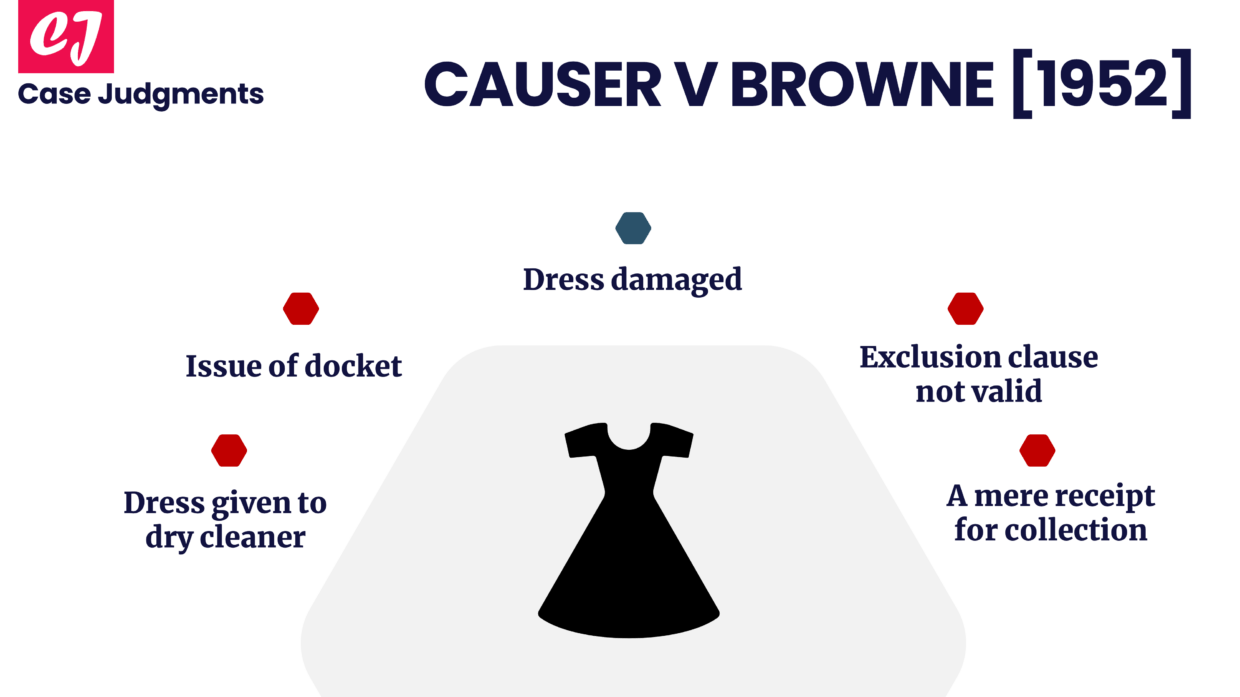
Causer v Browne [1952]: A Quick Summary
Case name & citation: Causer v Browne [1952] VLR 1
Decided on: 12 October 1951
The learned judge: Herring C.J.
Area of law: Exclusion of liability and its notice
What is the case about?
Causer v Browne [1952] is an Australian case concerning the effectiveness of an exclusion clause.
According to it, even if a statement excluding liability is placed on the back (or front) of a ticket that is given to a person at the time of hiring an item, a court may find that a reasonable person would expect the ticket to be merely a voucher providing evidence of payment rather than a contractual document.
Facts of the case (Causer v Browne)
In order to have her dress dry-cleaned, the plaintiff’s husband (Causer) left it with the defendant (Browne). The dress was stained by the defendant, who later attempted to absolve themselves of responsibility by relying on an exclusion clause that was printed on a docket and given to the plaintiff’s husband at the time of receipt. It said that there would be no responsibility of the dry cleaner for any loss or damage to the garment.
Issues that arose
Was the defendant liable for breach of contract and negligence?
Could the liability be avoided on grounds of the exclusion clause contained in the docket?
Judgment of the Court in Causer v Browne
The Court decided that the exclusion clause was not valid because a reasonable person would have thought that the docket was an aid to identify the dress for collection rather than a contractual document. And also, the fact that the docket contained any such exclusion terms was not brought to the attention of the customer.
Hence, the defendant (dry cleaner) was liable.
Relevance of the exclusion clause and its notice
The non-benefiting party must have been made aware of the existence of the exclusion clause in order for it to be considered a part of the contract. To put it another way, it is the duty of the party that will benefit from the clause to demonstrate that the other party was aware of both its existence and its terms.
Moreover, having an exclusion clause written into a document like a ticket, receipt, or notice, etc. may pose a number of issues. Would it be reasonable for a person to assume that the non-contractual document included such an exclusion of liability, or that it would even form part of a contract at all?
In the given case of Causer v Browne, the exclusion clause in the docket did not constitute a term of the contract.
List of references:
- http://ndl.ethernet.edu.et/bitstream/123456789/14461/1/110.pdf
- https://research.usq.edu.au/download/43cf27b05a63a94bc9be06d03297394864bd21862dc0f12e0c2d7998c7146402/193428/Jones_9_QUTLJJ_213_AV.pdf
- http://netk.net.au/Contract/Causer.asp
- https://www.coursehero.com/file/p60hmbr/Causer-v-Browne-1952-VLR1-Contract-contents-express-terms-in-a-non-contractual/
You might also like:
More from contract law:

